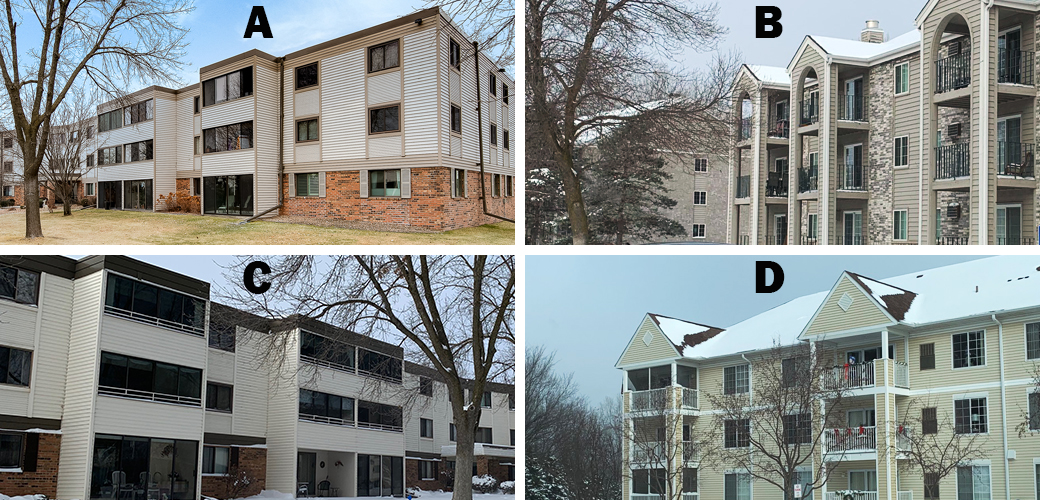
Think this might be the year you sell your house and move to a complex with one-level living and heated underground parking? You have multiple options, but often the biggest difference is in the form of ownership.
In the photo of the four buildings above, one is a building of condos, one is a 55+ co-op, one is a 55+ condo building and one is an apartment building. Can you tell which is which?
It can be virtually impossible to distinguish them from each other by the buildings, but there are differences in the form of ownership as well as rules and regulations.
A – building A is a building of condominiums
When you buy a condo you are buying a piece of real estate. For legal purposes it is the same as owning a house. If you finance your purchase it is secured by a real estate mortgage.
- You own the ‘air space’ of your unit… you own real estate property, just as you would a private house
- You also own an undivided percentage of the common elements and amenities of the building along with the other unit owners
- It is governed by an association of the unit members who elect a board of directors to oversee maintenance and enforcement of rules and regulations
- You pay monthly association fees determined by the association of which you are a part as an owner and which includes things such as: building exterior and common area maintenance, hazard insurance for the building and common areas, heating, professional management, sanitation, security system, shared amenities such as party room/pool/exercise equipment, snow/lawn care, water/sewer
- Most associations have rules about pets, which can vary from no restrictions at all to very tight restrictions with no pets of any kind. Dogs are the pets most often restricted, often by number/weight/height or breed limits.
- Other possible restrictions, established by
- Restricted move-in and move-out times and reserving elevator space; they will also often add padding to the walls to prevent scratches on both the walls and your furniture and there is also often a move-in/move-out charge, usually paid as part of your closing costs
- Requirements that floors must be carpeted or a percentage of the floor covered with area rugs to reduce the sounds of walking around your unit in the unit below
- Restricted times for doing laundry, both in your own unit or in a shared facility…again to minimize noise for sleeping neighbors
- Cannot make any changes to the exterior without board approval…can include anything, from painting your front door a different color to enclosing a porch to adding flowers by your front step or patio
- Parking may be restricted, both for you and for guests, and you likely will have to remove all vehicles from parking lots and driveways early in the morning for snow removal… of course, you don’t have to remove the snow yourself!
- Rentals usually require board approval…may have restrictions such no rentals at all, limited percentage of rentals in the complex, time limits on rentals (such as up to a 6-month lease allowed while you are away); board may even require credit and background checks on renters
RELATED POSTS
- Buying or Selling a Condo? Some things you need to know
- Should I be worried that a condo association is self-managed?
- What is a manor home?
- Why do you need HO6 insurance if you buy a condo or townhouse?
B – building B is an apartment building
An apartment is an air space, just like a condo… only your landlord owns the building and sets the rules and regulations and is responsible for maintenance.
C – building C is a 55+ condo building
A 55+ condo is the same as a condo, with the added restriction that at least one of the owners must be 55 years old or more.
D – building D is a cooperative, this one a senior co-op for owners 55+ years old
When you buy a co-op you are buying shares in a corporate entity whose assets include the building in which you will live. Typically you then enter into another agreement giving you the right to occupy ‘your’ unit as long as you pay your monthly assessments. Because you don’t own any real estate, financing is through special co-op financing rather than a traditional mortgage.
- You don’t own your unit
- You own shares in a corporate entity that owns your building with the contractual right to occupy your assigned unit
- Your initial purchase price may be less than for a condo of comparable size but monthly fees may be higher; co-ops may limit the amount that shares for a unit may appreciate in value when it is sold
- Your monthly association fees are typically higher than those for a condo because it may also include an underlying mortgage for the property held by the corporation as well as more common property and maintenance; for example, the corporation may own all the appliances in the units which they maintain or replace as needed
- It is governed by a board of directors, who frequently must approve any sale… you may even have to meet the other cooperative owners and be approved by them before buying into the co-op
In the Twin Cities area, senior co-ops for age 55+ are the most common form of cooperative living. It is fairly common for sales of these senior co-ops to be handled by the complex itself, so there may be more co-op units available for sale than are listed in the MLS.
RELATED POSTS
Sharlene Hensrud, RE/MAX Results – shensrud@homesmsp.com



